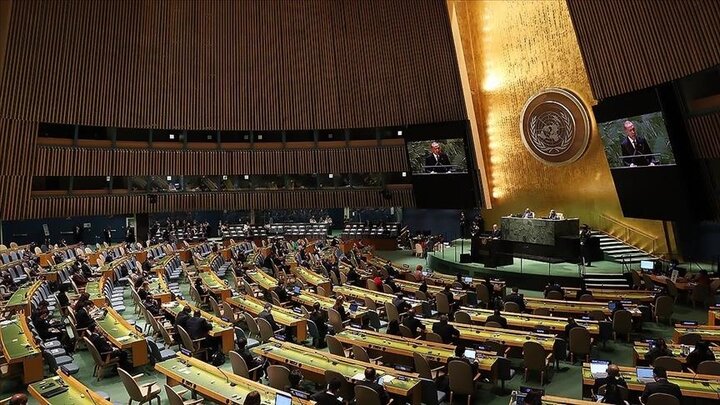New York Declaration Condemns Tel Aviv’s Global Isolation; Netanyahu Pins Hopes on Micro-States

The United Nations General Assembly on Friday adopted the “New York Declaration,” aimed at reinvigorating efforts toward a two-state solution to the longstanding Palestine-Israel conflict.The resolution passed with 142 votes in favor, 10 against-including Israel and the United States-and 12 abstentions. While acknowledging some positive elements, it condemned Hamas and called on the group to disarm.
This seven-page declaration represents the outcome of an international conference held last July at the UN, co-hosted by Saudi Arabia and France, addressing decades of conflict in Palestine. Although Israel and the United States boycotted this conference, the New York Declaration underlines “concrete, time-bound, and irreversible steps” toward establishing two states for Israelis and Palestinians.
The declaration strongly denounces Israeli attacks on civilians in Gaza, including destruction of civilian infrastructure, and also siege tactics causing hunger among Gaza’s population. It is indeed named after New York as it resulted from last July’s “Two-State Solution” conference held there under Saudi Arabian and French leadership.
The Arab league supported this declaration. France’s Foreign Minister Jean-Yves Le Drian welcomed it as a crucial step isolating Hamas internationally and regionally. The General Assembly approved it just ten days before a summit scheduled for September 22 at UN headquarters co-chaired by Paris and Riyadh-where President Emmanuel Macron pledged to recognize Palestinian statehood.
Main Provisions of The New York Declaration
The document dismisses Palestinian rights to resist ongoing Israeli aggression that preceded October 7th’s operation but condemns Hamas’ October 7th attack as a clear violation of international humanitarian law. It also condemns Israeli military actions against Gaza civilians-including bombings-and addresses severe humanitarian issues such as shortages of food, water, and electricity due to blockade policies.
Key points include:
Demands From Hamas: the declaration calls upon Hamas to immediately release all Israeli prisoners held in Gaza. It also requires Hamas to relinquish control over Gaza strip management and hand over weapons to the Palestinian Authority (PA).
Palestinian Authority’s Central Role: The declaration asserts that only the PA is authorized to govern all Palestinian territories-including both West Bank and Gaza-and enforce law there.
A transitional administrative committee supervised by PA would be established immediately following a complete ceasefire; its responsibility would be managing civil affairs and security operations within Gaza.
Time-Bound Implementation Steps: Concrete steps are urged with strict deadlines-ending hostilities in Gaza through disarmament efforts; releasing all captured Israelis; reopening border crossings; ensuring unfettered access for humanitarian assistance; empowering PA security apparatuses along with civil governance functions fully;
Laws And Core Principles: The declaration reaffirms adherence to international law standards including humanitarian laws protecting human rights while rejecting any demographic changes or forced displacement within Gaza’s population.
Additionally emphasized are respect for legal status of holy sites alongside guaranteeing sovereignty for an independent State of Palestine.
Motive Behind Washington’s And Tel Aviv’s Opposition:
The New York Declaration aligns with many Israeli demands such as prisoner releases or Hamas demilitarization but faces opposition primarily because it officially recognizes Occupied Palestine as an independent state-something rejected by Israel along with its allies like the US.
broadening International Isolation Of Israel:
The overwhelming passage through General Assembly vote itself reflects Israel’s growing global alienation; what stands out more is which countries sided against it during voting-a detailed look reveals most supporters backing Tel Aviv are microstates without geopolitical weight or significant roles in world order dynamics.
this vote ended with 142 supporting states worldwide across five continents versus only ten opposing votes from countries including USA,Israel itself plus Argentina,Hungary Paraguay plus smaller nations Micronesia Palau Papua New Guinea Tonga-with half classified more so symbolic sovereign entities rather than influential global actors.
Similarly applies regarding abstentions: Czech Republic Cameroon Democratic Republic Congo Ecuador Ethiopia Albania Fiji Guatemala Samoa North Macedonia Moldova South Sudan registered abstain.
.


